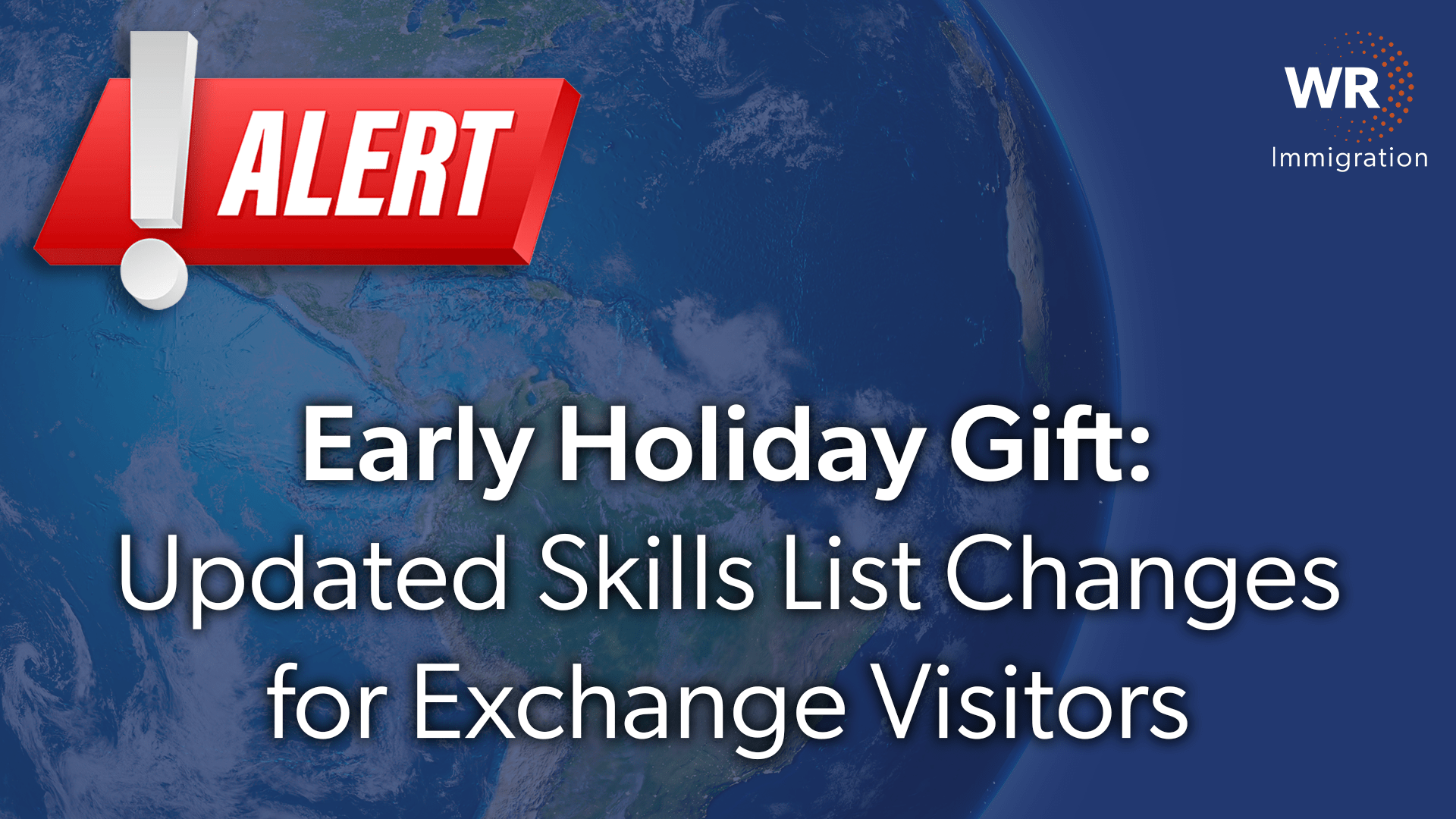| Question | Revised Exchange Visitor Skills List |
| 1. What is the Exchange Visitor Skills List? | The Exchange Visitor Skills List (“Skills List”) is a list of countries identified by the Secretary of State as having a clear need for individuals with expertise in specific fields of specialized knowledge or skills. This list is utilized by the Department of State and the Department of Homeland Security to determine whether a J-1 nonimmigrant exchange visitor is subject to the two-year home residence requirement under Section 212(e) of the Immigration and Nationality Act. |
| 2. What is the two-year home residence requirement? | Certain J-1 exchange visitors are required to return to their home country or country of last residence and live there for at least two years before they can apply for certain U.S. visas or permanent residency. Individuals subject to the home residence requirement were ineligible to apply for permanent residency or certain non-immigrant visas until they had satisfied the two-year residency requirement or obtained the J-1 Skills List waiver. |
| 3. What was the major change announced in the December 9, 2024, update? | J-1 exchange visitors who were previously subject to the two-year home residence requirement based on an earlier version of the Skills List are no longer subject to this requirement if their home country is not included in the revised Skills List. Notably, India, China, Brazil and South Korea were removed from the Skills List, meaning their nationals are no longer automatically subject to the two-year home residence requirement based on the revised list. |
| 4. Which countries were removed from the Skills List? | The U.S. Department of State’s updated Exchange Visitor Skills List, effective December 9, 2024, has removed the following countries: – Asia: Bahrain, Bangladesh, China, India, Indonesia, Kazakhstan, Laos, Malaysia, Oman, Saudi Arabia, South Korea, Sri Lanka, Thailand, United Arab Emirates – Europe: Albania, Armenia, Georgia, Montenegro, Romania – Americas: Argentina, Bolivia, Brazil, Chile, Colombia, Costa Rica, Dominican Republic, Guyana, Paraguay, Peru, Trinidad and Tobago, Uruguay – Africa: Algeria, Eswatini (Swaziland), Gabon, Mauritius, Namibia, South Africa |
| 5. Why were these countries removed from the list? | The countries were removed because they no longer meet the criteria set for inclusion. These countries surpassed the thresholds outlined for economic development and specialized skill needs. |
| 6. When does the new Skills List go into effect? | The updated Skills List is effective as of December 9, 2024, and supersedes the 2009 version. |
| 7. How does this update impact current exchange visitors from the countries removed from the list? | Skills List is retroactive which means: – Exchange visitors from the 34 countries previously on the Skills List who were subject to the two-year home residence requirement under previous versions of the Skills List will no longer be subject to it based on the revised list. – However, other factors (e.g., U.S. government sponsorship or specific program agreements) may still impose this requirement. |
| 8. Can exchange visitors from the countries who were previously subject to the Skills List now apply for a change or adjustment of status? | Yes, if their J-1 program made them subject to the Skills List requirement only and no other factors apply (e.g., U.S. government sponsorship or specific program agreements). |
| 9. What criteria are used to determine if a country should be included on the Skills List? | Countries are included if they meet one or more of the following: – Per capita GDP below $7,500 (2023 PPP dollars). – GDP between $7,500 and $15,000 but with a small population or significant outbound migration rates, indicating challenges in developing skilled labor forces. – Low standard of living or barriers to accumulating human capital, determined through objective, measurable economic indicators. |
| 10. What is the purpose of the Skills List? | The Skills List supports the development of countries by ensuring their nationals with specialized skills return home, contributing to their country’s growth and addressing skill shortages. |
| 11. How often will the Skills List be updated? | The Department of State plans to review and update the Skills List every three years. |
| 12. When was the last time the Skills List was updated? | April 30, 2009 |
| 13. Who can request clarification on their status regarding the two-year residence requirement? | Exchange visitors can request an Advisory Opinion from the Waiver Review Division to clarify whether the two-year home residence requirement applies to them. |
| 14. Which countries are subject to the Skills List as of December 9, 2024? | The Department of State’s Skills List by Country can be found: https://travel.state.gov/content/travel/en/us-visas/visa-information-resources/skill-list-by-country.html – Asia: Burma (Myanmar), Cambodia, Lebanon, Nepal, Palestinian Authority (West Bank and Gaza), Philippines, Tajikistan, Timor-Leste, Yemen – Europe: Kosovo – Americas: Belize, Ecuador, El Salvador, Guatemala, Haiti, Honduras, Jamaica, Nicaragua, Venezuela – Africa: Benin, Burkina Faso, Cameroon, Cabo Verde (Cape Verde), Democratic Republic of the Congo, Djibouti, Eritrea, Ethiopia, The Gambia, Ghana, Kenya, Liberia, Malawi, Mali, Mauritania, Mozambique, Niger, Nigeria, Rwanda, Senegal, Tanzania, Togo, Zambia – Oceania: Fiji, Tonga |
Department of State Revised Exchange Visitor Skills List Update: Frequently Asked Questions

Related Posts:

